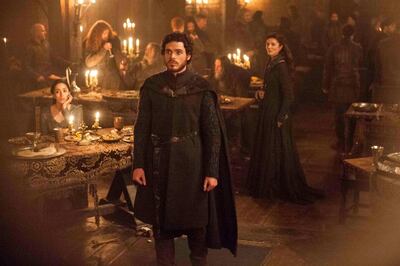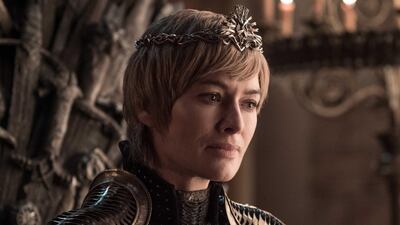It's probably the cultural event of the year. But as a staggering 30 million people around the world – and that's just the official figure – settle down to watch the highly anticipated final Game of Thrones battle between the living and the dead this Sunday (Monday in the UAE), consider this.
Back at the beginning of this decade, HBO took some convincing that the tale of nine noble families fighting for control of Westeros against a backdrop of an ancient, supernatural enemy on the rise would make for compelling television at all. Co-creator and showrunner Daniel Weiss tells the story of a pilot that had to be reshot, as the network was "really on the fence" about whether they would commission a series that his fellow showrunner David Benioff described – only half jokingly – as "like The Sopranos meets Middle-Earth".
So how did we get to the point, eight years and 67 incredible episodes later, where Game of Thrones is not only one of the most popular television dramas of all time, but probably the most influential, too? The answer lies somewhere in Benioff's quip. For all the fantasy, for all the dragons, direwolves and icy White Walkers, it's the dark and viciously bloody nature of The Known World that really gripped imaginations – the political skulduggery, violence and betrayal is as compelling as anything mob drama The Sopranos offered up.
There was a huge surprise in that first series, too – hero Ned Stark (Sean Bean) literally losing his head in the penultimate episode. It doesn't sound groundbreaking now, in a world in which Breaking Bad and The Walking Dead killed off their leads with impunity. But it went against most of the accepted rules of television at the time – and the death count became strangely crucial to the entire premise of the show. Benioff once revealed that "what if the hero dies" was part of the original pitch: Bean's neck having an untimely encounter with a sharp blade was not only a genuine "what just happened!" social moment in the early days of Twitter, but a useful barometer for how deeply ingrained the show had quickly become in the hearts of its fans.
It also said to its audience that in the wild world of Westeros, anyone could die at almost any point. And they did. Look away now if you’re still catching up, but the ostensibly happy occasion of a marriage in season three was proof that this was edge-of-the-seat television. It swiftly turned into the complete massacre known as The Red Wedding – alongside King Robb Stark, his wife Queen Talisa and his mother Lady Catelyn, about 15,000 people die.

And, of course, one of the great Game of Thrones moments has been the is-he-isn't-he intrigue over the death of Jon Snow (Kit Harington). By the time he had been stabbed – a state of affairs that was endlessly talked about between seasons five and six back in 2015 and 2016 – each episode reportedly cost more than $10 million (Dh36.7m) to produce, confirmation that HBO's ambition to shift the cultural focus away from cinema and in to living rooms (or indeed on to tablets) was both bearing fruit and incredibly expensive.
True, adapting George R R Martin's books for the big screen wouldn't have worked in any case – they are too involved, too intricate, and probably too graphic for a three-hour, mass market film. Instead, Game of Thrones will, in the end, look like the "73-hour movie" that Weiss and Benioff had always dreamed of.
And perhaps that's the feature's real legacy – it has raised expectations about what fantasy epics could and should look like on the small screen. The touchstones for the cinematography in series seven's Loot Train battle, for example, were the grand spectacles of Oscar-winning films Apocalypse Now and Saving Private Ryan – and the sweeping landscapes of artist J M W Turner.
Talking to The Guardian recently about the adaptation of the witty fantasy Good Omens, out next month on Amazon Prime, co-author Neil Gaiman admitted that Game of Thrones has had a massive effect – not in terms of the acceptance of fantasy to the mainstream, but of big budgets. "I knew I didn't want to make the cheap kid brother to Game of Thrones," he said. "Amazon understood that and were supportive. The game-changer is the idea that you can make TV at that budget and it can be a serviceable business model."
Amazon is certainly more convinced – or should that be swayed – by the Game of Thrones effect than most, with a number of ambitious episodic series planned to fill a Westeros-shaped void when season 8 draws to a close on May 19. Stephen King's Dark Tower series, featuring a gunslinger's quest towards, yes, a tower, goes into production next month, despite the 2017 film adaptation being a total flop. The streaming service also has plans in motion for a Lord of the Rings series – which may end up costing close to a frankly ridiculous $1 billion to produce (it's expected to be connected stories rather than a straight reshooting of the films). And The Wheel of Time, a 14-book epic fantasy from Robert Jordan and Brandon Sanderson, is also slated to start shooting later this year.
Netflix, obviously, wants a piece of the Game of Thrones action, too, with Polish writer Andrzej Sapowski's The Witcher – a monster hunter with supernatural powers, played by Henry "Superman" Cavill – hitting screens by the end of this year. Netflix is also developing Shadow and Bone, an eight-episode series based on Leigh Bardugo's bestselling Grishaverse fantasy novels – as well as a Chronicles of Narnia series, though presumably that will target a younger audience, given its hero is a talking lion.
But then, do people actually want the next Game of Thrones to be a clone of what they've fallen for over the past eight years? Actually, the greatest compliment that could be paid to this incredible series is not obvious imitation, but a similar commitment to intriguing, innovative and most of all, surprising television. It's why HBO's plans for Who Fears Death, by Nigerian-American writer Nnedi Okorafor, are so intriguing; it's a science-fantasy novel set in post-apocalyptic Sudan, where the hero goes on a quest to defeat her sorcerer father using magical powers.
If that doesn't sound anything like Game of Thrones, then so much the better. And if it doesn't work, of course, HBO will still have a home banker in Long Night, the Game Of Thrones prequel, which begins filming this summer. That's the thing about this cult TV series: it's become the Star Wars of its age. It might be coming to a close, but the fan base, the legend and spin-offs most certainly aren't.



